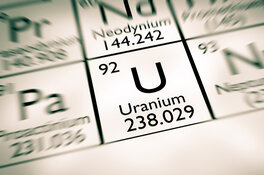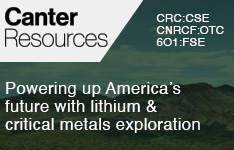The uranium market has shown remarkable resilience and potential for significant growth, driven by a push for global strategic investments, regulatory changes, and burgeoning demand from emerging technologies. Experts have highlighted the pivotal role of uranium in the energy sector, projecting a robust future for the commodity.
According to the World Nuclear Association in May, the uranium market is expected to grow significantly, with the Reference Scenario of the 2023 edition of the World Nuclear Association's Nuclear Fuel Report projecting a 28% increase in uranium demand over 2023-2030 and a 51% increase for the decade 2031-2040. The association emphasized that the demand for uranium fuel was much more predictable than with probably any other mineral commodity due to the high capital and low fuel cost structure of nuclear power generation.
They also noted that there was plenty of scope for growth in nuclear capacity in a world concerned with limiting carbon emissions, with electricity demand by 2040 potentially increasing by about 50% from that of 2022. Strategic investment in uranium production became a priority while world prices had been generally low, with countries like Russia and China seeking equity in uranium mines abroad. Reprocessing capacity was expanding, with further capacity under construction in Russia and China, indicating strong future prospects for the uranium sector.
Legislative Support and Corporate Beneficiaries
On the legislative front, President Biden signed a bipartisan bill aimed at bolstering the nation's nuclear power, marking a historic win for the sector. According to The Hill, on July 9, the nuclear package was expected to speed up the timeline for licensing new nuclear reactors and cut fees that companies had to pay to do so.
President Biden signed a bipartisan bill aimed at bolstering the nation's nuclear power, marking a historic win for the sector. According to The Hill, on July 9, the nuclear package was expected to speed up the timeline for licensing new nuclear reactors and cut fees that companies had to pay to do so.
The bill also required the Nuclear Regulatory Commission to consider ways to simplify and shorten the environmental review process for such reactors.
Supporters claimed the legislation would help bring more climate-friendly nuclear power online, which could further boost the demand for uranium.
Sen. Tom Carper (D-Del.) stated that this bipartisan law would strengthen energy and national security, lower greenhouse gas emissions, and create thousands of new jobs while ensuring the continued safety of this zero-emissions energy source.
However, the bill was not without its critics, who raised concerns about potential safety issues and challenges related to nuclear waste.
Market Dynamics and Technological Influence
The recent tax hike in Kazakhstan has further bolstered the uranium market's dynamics. According to Track Insight on July 16, Kazakhstan's recent MET hike for uranium sparked a surge in uranium stocks, highlighting the market's robust response and potential for elevated uranium prices. The tax hike introduced a more intricate rate structure, which analysts believed might discourage increased production by Kazatomprom (NATKY:OTCMKTSKAP) the world's largest uranium producer, potentially lending support to sustain, if not elevated, uranium prices.
Kazatomprom's significant role, contributing roughly 20% of the world's primary uranium production, underscored the potential positive impact on global uranium prices due to the new tax changes. The market's positive reaction to the MET hike reflected confidence in the potential for higher uranium prices, driven by the strategic changes in Kazakhstan's tax structure. This development introduced a new layer of complexity that could ultimately benefit the uranium sector by supporting sustained higher prices, making it a promising time for investors.
The intersection of technology and energy demand has also played a crucial role in the uranium market's upward trajectory. In a May post for Nikkei Asia, it was noted that investors who had flocked to semiconductor stocks on the back of the generative artificial intelligence (AI) boom were starting to buy shares linked to nuclear power generation and its primary fuel, uranium. Prices of uranium had jumped some 70% over the past year, reflecting investor expectations that nuclear power-related companies would benefit from an explosive increase in electricity demand resulting from the widespread generative AI use.
Goldman Sachs reinforced its presence in the market by expanding into uranium options trading for hedge funds on top of physical uranium, highlighting the growing interest and investment in the uranium sector. The general industry consensus remained that further increases in uranium prices were inevitable as expanding demand growth came up against limited supply availability, according to Andre Liebenberg, CEO of Yellow Cake.
The generative AI boom drastically changed the situation for uranium, with prices rising in line with the PHLX Semiconductor Sector (SOX) index, indicating a strong link between AI demand and uranium investment. Tech companies had in general been very active in understanding their role in energy demand, with nuclear providing a baseload constant power, as noted by Surya Hendry, an analyst with Oslo-based research firm Rystad Energy. Mark Casey, an equity portfolio manager at U.S. financial services company Capital Group, added that big tech companies would be a key driver in reigniting the nuclear power conversation. With the widespread use of AI and a steep increase in demand for electricity paving the way for the nuclear renaissance, the uranium market was set for significant growth and investment.
With uranium stretching into new markets and uses, here are three companies aiming to be a part of its growing need.
Tisdale Clean Energy Corp
Tisdale Clean Energy Corp. (TCEC:CSE; TCEFF:OTCQB; T1KC:SE) is a uranium exploration company with properties in the Athabasca Basin of northern Saskatchewan, Canada.
 Streetwise Ownership Overview*
Streetwise Ownership Overview*
Tisdale Clean Energy Corp. (TCEC:CSE; TCEFF:OTCQB; T1KC:SE)
Tisdale is advancing the South Falcon East uranium project just outside the southeastern part of the basin as part of an earn-in agreement with Skyharbour Resources.
The South Falcon East project, drilled back in March, reported results in early April. Since then, Tisdale has remained on the radar due to its potential and strategic positioning. The company completed a financing at CA$0.18 in early 2024. Though the selection has been less than robust, it remains a key proxy for uranium ownership, especially after other holdings were exited when uranium prices surged past $100/lb. in early 2024.
The 12,234-hectare South Falcon East property encompasses the near-surface Fraser Lakes Zone B deposit, which has a historical inferred resource of about 7 million pounds of U3O8 at 0.03% and 5.3 million pounds of thorium dioxide at 0.023% within 10,354,926 tons using a U3O8 cutoff grade of 0.01%. Nearby, significant uranium companies such as Cameco Corp., Denison Mines Corp., NexGen Energy Ltd., and Rio Tinto Plc are operating, underscoring the potential of Tisdale's project.
*Technical analyst Clive Maund recommended Tisdale as a Strong Buy for all time horizons in June. He noted that although the stock had been declining in price since last spring, it was showing signs on its one-and-two-year charts that it was "set to reverse to the upside soon." With a market cap of slightly below US$2 million, Tisdale represents a very cheap call option on the uranium space and the ultimate recovery in uranium juniors.
Tisdale provided a breakdown of the company's ownership and share structure, where CEO Alex Klenman owns 5.04% of the company with 1,591,300 shares.
Planet Ventures Inc. owns approximately 12% of the company, with 3.88 million shares, while Skyharbour Resources owns approximately 3.5%, with 1.11 million.
Tisdale has 31.54 million outstanding shares and 26.6 million free-float traded shares.
Over the past 52 weeks, the company has traded between CA$0.08 and CA$0.40 per share and has a market cap of CA$3.15 million.
Skyharbour Resources Ltd.
Skyharbour Resources Ltd. (SYH:TSX.V; SYHBF:OTCQX; SC1P:FSE) reported assay results from its 2024 winter diamond drilling program at its 100%-owned Moore Lake uranium project in Saskatchewan's Athabasca Basin earlier this month.
 Streetwise Ownership Overview*
Streetwise Ownership Overview*
Skyharbour Resources Ltd. (SYH:TSX.V; SYHBF:OTCQX; SC1P:FSE)
Notably, hole ML24-08 intersected 5 meters of 4.61% U3O8 at a shallow depth, including 10.19% U3O8 over 1 meter at the Main Maverick Zone. CEO Jordan Trimble highlighted the high-grade, shallow uranium mineralization and announced plans for further drilling this summer to expand these zones.
The company plans to continue advancing Moore with additional drilling in 2024, alongside a fully funded summer drilling program at Russell Lake, where a recent intercept marked the best historical uranium mineralization at the project. Analyst David Talbot of Red Cloud Securities viewed the Russell Lake discovery positively, citing its potential to support a follow-up summer drill program.
Skyharbour's extensive portfolio includes 29 projects in the Athabasca Basin, with 10 drill-ready sites covering over 587,000 hectares. The company employs a prospect generator strategy, partnering with firms like Azincourt Energy Corp., Thunderbird Resources Ltd., Basin Uranium Corp., and Medaro Mining Corp. Recently, Skyharbour signed earn-in option agreements with Tisdale Clean Energy Corp. for the South Falcon East project and North Shore Uranium Ltd. for the Falcon project.
Preparation is underway for a fully funded 2,500- to 3,000-meter summer drill program at Moore and a 4,500- to 5,000-meter drill program at Russell Lake. Skyharbour's exploration efforts aim to capitalize on the growing demand for uranium, driven by the global push for clean energy and technological advancements.
Management, insiders, and close business associates own approximately 5% of the company. According to Reuters, the CEO Trimble owns 1.54%, and Director David Cates owns 0.70%.
Institutional, corporate, and strategic investors own approximately 55% of the company. Denison Mines owns 6.3%, Rio Tinto owns 2.0%, Extract Advisors LLC owns 9%, Alps Advisors Inc. owns 9.91%, Mirae Asset Global Investments (U.S.A) L.L.C. owns 6.29%, Sprott Asset Management L.P. owns 1.5%, and Incrementum AG owns 1.18%, Reuters reported.
There are 182.53 million shares outstanding with 177.73 million free float traded shares, while the company has a market cap of CA$69.36 million and trades in a 52-week range of CA$0.33 and CA$0.64.
North Shore Uranium Ltd.
North Shore Uranium Ltd. (NSU:TSX) announced it was gearing up for a follow-up drill program at its Falcon project and a maiden drill campaign at its West Bear project, both located in Saskatchewan's Athabasca Basin.
President and CEO Brooke Clements highlighted that the initial results at Falcon suggested significant potential, warranting further exploration. "We think we've just scratched the surface at Falcon," Clements told RCTV. "More work is clearly warranted on the discoveries we made this winter. We have a lot of untested, high-priority targets that we want to evaluate."
The Falcon project, spanning 55,000 hectares, saw its maiden drill program completed earlier this year. Key targets were identified using historical data and results from airborne geophysical surveys conducted in 2006, 2007, and 2022. Analyst David Talbot of Red Cloud Securities noted that the initial drill program identified structures and alteration typical of basement-hosted uranium mineralization, calling the results a positive first step.
At the Falcon project, near-surface mineralization was discovered at two targets, PO3 and PO8, located 1.3 kilometers apart. At PO3, a subvertical graphitic brittle fault zone was encountered, with five intervals showing over 100 parts per million (ppm) U3O8, and three samples exceeding 300 ppm U3O8. At PO8, near-surface uranium mineralization was found between 42 and 47 meters, with a 4.7-meter interval averaging 316 ppm U3O8, and a peak value of 572 ppm.
Regarding the West Bear project, North Shore prepared for its first drill program, a previously unexplored area. The last significant drilling in the area was conducted by Denison Mines Corp. in 2015. Limited historical drilling has been done on the property, and about 1.5 kilometers north of West Bear, Uranium Energy Corp. has the only cobalt-nickel resource in the basin, as well as a uranium reserve.
Clements expressed optimism about North Shore's prospects, highlighting the company's strategic position in the growing uranium market. "We offer good value for exposure to grassroots uranium exploration. It looks like we're at the beginning of a major bull cycle in uranium, and excitement is building in the exploration sector."
*Technical analyst Clive Maund also recommended North Shore as a Strong Speculative Buy in May, viewing the stock's potential positively.
Analyst David Talbot of Red Cloud Securities echoed this sentiment, stating that as North Shore continued to execute its exploration strategy at Falcon and West Bear, the stock had the potential to rerate.
Among the reasons investors should consider North Shore, Clements said, are its ownership by insiders and founding investors, tight share structure, and attractive valuation.
Insiders and founding investors own approximately 45% of the issued and outstanding shares. Clements himself owns 3.43% or 1.26M shares, Director Doris Meyer has 2.11% or 0.78M shares, and Director James Arthur holds 1.45% or 0.53M shares.
Most of the rest is with retail, as the institutional holdings are minor.
North Shore has 36.84M outstanding shares.
The company has a market cap of CA$2.95 million at the recent price of CA$0.10 per share. It has traded in the past 52 weeks between CA$0.075 and CA$0.30 per share.
| Want to be the first to know about interesting Uranium investment ideas? Sign up to receive the FREE Streetwise Reports' newsletter. | Subscribe |
Important Disclosures:
-
- Tisdale Clean Energy and Skyharbour Resources are a billboard sponsor of Streetwise Reports and pays SWR a monthly sponsorship fee between US$4,000 and US$5,000. In addition, North Shore Uranium has a consulting relationship with an affiliate of Streetwise Reports, and pays a monthly consulting fee between US$8,000 and US$20,000.
- As of the date of this article, officers and/or employees of Streetwise Reports LLC (including members of their household) own securities of Tisdale Energy and North Shore Uranium.
- James Guttman wrote this article for Streetwise Reports LLC and provides services to Streetwise Reports as an employee.
- This article does not constitute investment advice and is not a solicitation for any investment. Streetwise Reports does not render general or specific investment advice and the information on Streetwise Reports should not be considered a recommendation to buy or sell any security. Each reader is encouraged to consult with his or her personal financial adviser and perform their own comprehensive investment research. By opening this page, each reader accepts and agrees to Streetwise Reports' terms of use and full legal disclaimer. Streetwise Reports does not endorse or recommend the business, products, services or securities of any company.
For additional disclosures, please click here.
* Disclosure for the quotes from the Clive Maund article published on May 1, 2024 and June 11, 2024
- For the quoted articles (published on May 1, 2024 and June 11, 2024), the Company has paid Street Smart, an affiliate of Streetwise Reports, between US$1,500 and US$2,500.
- Author Certification and Compensation: [Clive Maund of clivemaund.com] is being compensated as an independent contractor by Street Smart, an affiliate of Streetwise Reports, for writing the article quoted. Maund received his UK Technical Analysts’ Diploma in 1989. The recommendations and opinions expressed in the article accurately reflect the personal, independent, and objective views of the author regarding any and all of the designated securities discussed. No part of the compensation received by the author was, is, or will be directly or indirectly related to the specific recommendations or views expressed
Clivemaund.com Disclosures
The quoted article represents the opinion and analysis of Mr. Maund, based on data available to him, at the time of writing. Mr. Maund's opinions are his own, and are not a recommendation or an offer to buy or sell securities. As trading and investing in any financial markets may involve serious risk of loss, Mr. Maund recommends that you consult with a qualified investment advisor, one licensed by appropriate regulatory agencies in your legal jurisdiction and do your own due diligence and research when making any kind of a transaction with financial ramifications. Although a qualified and experienced stock market analyst, Clive Maund is not a Registered Securities Advisor. Therefore Mr. Maund's opinions on the market and stocks cannot be only be construed as a recommendation or solicitation to buy and sell securities.




































